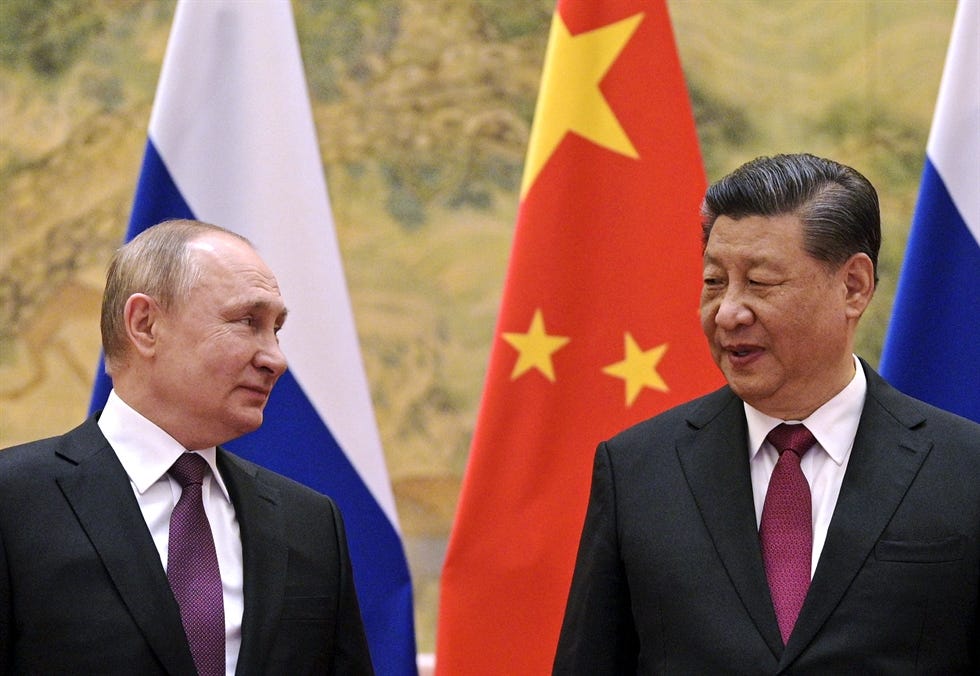China-Russia Alliance: Shared Antagonisms
‘Friends’ keep a wary eye on each other as Turkey seeks to expand its interests
The informal alliance forged this month between Russia’s Vladimir Putin and China’s Xi Jinping demonstrates the global political potential of the seemingly unrelated Ukraine and Taiwan issues.
At one it is a serious threat in Asia and Europe to the US and its various allies. China has no specific interest in Ukraine and cannot openly back any Russian attempts to seize territory. However, It may embolden, Putin who is otherwise rather lacking in foreign friends. Meanwhile, it may also seem to strengthen Beijing’s hand in raising the cost to the US, Japan, and others in defending Taiwan.
However, the alliance of mutual interest is also a reminder of the weaknesses of both parties, both internationally and in terms of their efforts to sustain empires created by the Qing and Romanov dynasties. For China, lacking friends in Asia other than Cambodia and Pakistan, it was partly a response to the Quad (US, Japan, Australia, India group) and the Australia-US-UK alliance. Russia meanwhile needed an anti-western friend in an attempt to offset the ill-will generated by its threats to Ukraine.
One key issue that drives the two together is natural resources. China wants this relatively close, piped gas supply. Russia wants to reduce its dependence on exports to Europe. Another is the desire for stability in Central Asia which means cooperation against the spread of Islamist ideas, a goal which it shares with the current rulers of those states. And secondly, it wants to use money and implied threats to keep the lid on Turkic identity which could link central Asian aspiration to those of the oppressed Uighurs (and some Kazakhs) of once almost all Turkic Xinjiang.
Russia meanwhile, as evidenced by its zeal to rescue the government of President Tokaev in Kazakhstan from an uprising, seeks to maintain what influence it can among states which became independent only 30 years ago after centuries of Russian and then Soviet occupation and colonization. The large Russian minority in Kazakhstan – and the ever-present threat of Russia claiming the chunk of northeast Kazakhstan where the Russians are the majority – acts as a strong brake on the stealthy Kazakhization process which former president Nazarbayev.
Old enmities have for now been put aside by China. Beijing has gone quiet about the fact that the Qing empire lost huge amounts of territory to imperial Russia, land now in Russia and also partly in Kazakhstan. One loss was in the same so-called “unequal treaty,” the 1860 Convention of Peking, which expanded British territory in Hong Kong through the addition of the Kowloon peninsula. Doubtless, this Chinese revanchist claim can be revived in the future as circumstances require.
Meanwhile, Russians, while tending to support Putin’s nationalism towards Ukraine and Europe, continue to worry about their hold on the thinly populated Far East adjoining much more populated Chinese territory, and even the proximity of Sakhalin to Hokkaido in Japan. (Sakhalin was also once part of the Qing empire)
That extends to its military situation. A deal with Xi means Putin can take troops from his eastern to his western borders. But it is a reminder that Russia as a whole has only 145 million people in a huge land with many frontiers and also many minorities (20 percent of the population). Putin has spent heavily to modernize Russian forces, including its naval capability from Vladivostok and Petropavlovsk. But it has more to lose than gain from China acquiring Taiwan. Meanwhile, they both have wonder where their shared neighbor, nuclear-armed North Korea, is going.
For all their assertions of mutual interests whether in space cooperation or opposing western liberalism and so-called “color revolutions,” China is aware that Russia’s global influence is modest, particularly in Asia. Such traditional friends that it has, notably India and Vietnam, have been cozying up to the US out of fear of China.
Meanwhile still on the sidelines is another former imperial power looking to extend its influence – Turkey. The Ottoman empire’s loss of large areas to imperial Russia and its Slav associates – notably Bulgaria -- in the 19th still rankles. Many of these areas still have predominantly Muslim populations, which now matters to a Turkey under President Erdogan which is less secular than any of its republican predecessors.
Erdogan’s relations with Europe are strained by his authoritarian tendencies and the realization that Turkey will never join the European Union. Thus it is looking to expand its influence in the Middle East, and is becoming more aware of its Turkic cousins in Central Asia for whom it may seem a model of development. Meanwhile, it remains a member of Russia’s foe, NATO, and is determined to limit Russia’s influence in the Middle east.
Three months ago the Cooperation Council of Turkish Speaking States changed its name to the more direct Organization of Turkic States. It joins Turkey to Kazakhstan, Kyrgyzstan, and Uzbekistan, with Turkmenistan and Hungary as associates. It thus far has no political role but there is clearly potential for Turkey, more developed and as populous as the other members combined, to use its linguistic, ethnic, and religious affiliations as a way of expanding its influence in Central Asia.
Turkey itself has a migrant population of Uighurs and has raised the Uighur issue in Xinjiang with China. Compared to Russia, let alone China, the Turkic peoples may seem of minor relevance. But they occupy vast spaces and are a growing number while Chinese and (ethnic) Russian numbers have begun to decline.




